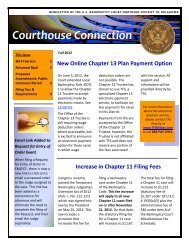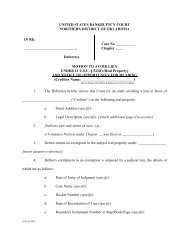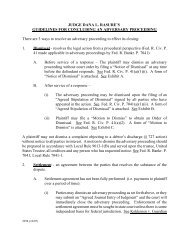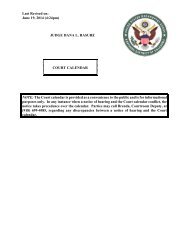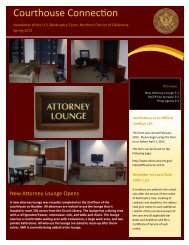The Published Opinions of Judge Terrence L. Michael
The Published Opinions of Judge Terrence L. Michael
The Published Opinions of Judge Terrence L. Michael
You also want an ePaper? Increase the reach of your titles
YUMPU automatically turns print PDFs into web optimized ePapers that Google loves.
47. Bailey v. Bailey (In re Bailey), 285 B.R. 15 (November 8, 2002). Adv. No. 02-0030-<br />
M.<br />
ISSUE: Whether an obligation to pay $90,000 to an ex-spouse under the<br />
terms <strong>of</strong> a divorce decree constituted alimony, maintenance or<br />
support under § 523(a)(5) <strong>of</strong> the Bankruptcy Code.<br />
RULING: <strong>The</strong> Court held, based upon the facts <strong>of</strong> the case, that the $90,000<br />
award was in the nature <strong>of</strong> a property settlement (the division <strong>of</strong> a<br />
jointly owned business venture) and was therefore dischargeable.<br />
<strong>The</strong> court noted that the debtor had treated a portion <strong>of</strong> his payments<br />
<strong>of</strong> the award as alimony for income tax purposes. <strong>The</strong> Court found<br />
that the tax treatment <strong>of</strong> an obligation was but one factor to be<br />
considered in determining whether that obligation constitutes<br />
“alimony, maintenance or support” and rejected the argument that<br />
such treatment mandated a finding that the obligation was alimony for<br />
bankruptcy purposes.<br />
48. In re Wallace, 288 B.R. 139 (December 6, 2002). Case No. 02-00073-M.<br />
ISSUE: Whether, as a result <strong>of</strong> filing pleadings containing baseless legal and<br />
factual allegations, filing restrictions should be imposed against a pro<br />
se debtor.<br />
RULING: Yes. <strong>The</strong> court concluded that filing restrictions should be imposed<br />
where the pleadings were filed in a pattern <strong>of</strong> abusive behavior, where<br />
derogatory accusations were being made in the pleadings against the<br />
attorneys and judicial <strong>of</strong>ficer in the case, and where no evidence was<br />
presented to substantiate the accusations. <strong>The</strong> court determined that<br />
the nature <strong>of</strong> the restrictions must be decided on a case by case basis<br />
balancing the need <strong>of</strong> the pro se Debtor to have access to the court<br />
to address true and legitimate issues with the need to eliminate the<br />
waste <strong>of</strong> time and energy <strong>of</strong> all involved in responding to spurious<br />
allegations. In this case, the restrictions included requiring the debtor<br />
to state under penalty <strong>of</strong> perjury that the pleading was well founded<br />
in fact and law and not filed for an improper purpose. Debtor was<br />
also required to disclose whether he received any assistance in the<br />
preparation <strong>of</strong> pleadings and to affirm his intention to abide by the<br />
rules <strong>of</strong> the court.<br />
49. In re Sabre International, Inc., 289 B.R. 420 (February 18, 2003). Case No. 01-<br />
04481-M.<br />
ISSUE: Whether an accounting firm, a member <strong>of</strong> which served as prepetition<br />
receiver for the debtor and chief executive <strong>of</strong>ficer <strong>of</strong> the<br />
18



